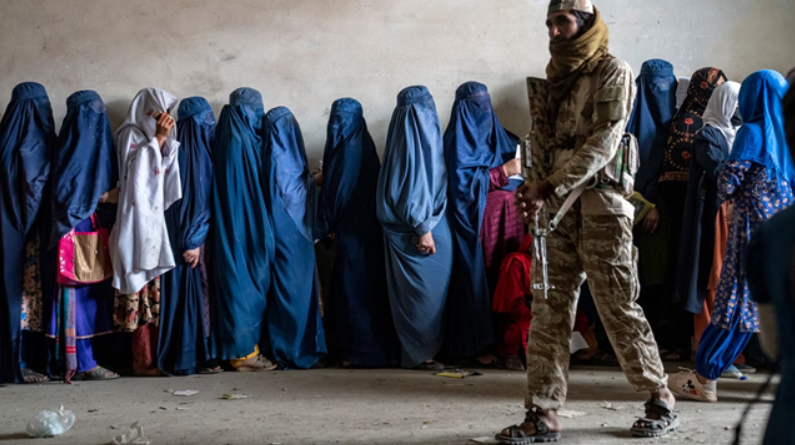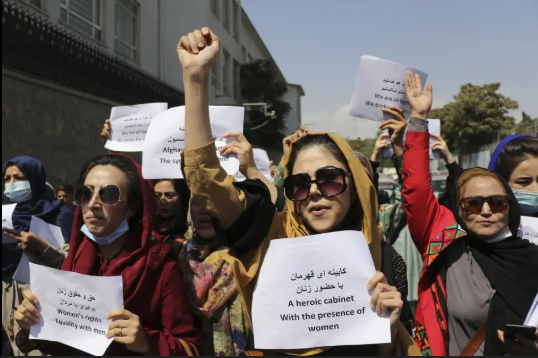Women’s rights in Afghanistan: the hope amidst repression
- Isabel Vodrazka de Miranda
- Jan 15, 2025
- 3 min read

“The situation wasn’t perfect, but it was improving”, words from a young Afghan woman who escaped her home country, with the support of organisation Setare. Setare aims to help women escape the repression in Afghanistan by bringing them to Portugal and giving them the opportunity to continue their studies here, highlighting the fight against Taliban’s return to power and its devastating effects.
Recently, having had the opportunity to interview this woman, I got to delve deeper into the thoughts and opinions from those experiencing such large scale marginalisation. The enlightening interview allows for a necessary point of view on the stark conflict happening at the moment.
For further context, in 2021, Taliban returned to power after having been removed from this same 20 years ago. In these past few years, the group has implemented several repressing and harsh rules, the main stakeholder affected being women and children. Girls are banned from secondary and any higher level of education, and more recently excluded from most professions such as midwifery. However, underground and illicit schools persist, showing the unyielding fight and hope amidst repression.
For instance, before the Taliban’s resurgence, the interviewee recalls an improving political state for her home country, “During those 20 years, there were a lot of improvements” economically and socially. Having herself begun studying building construction management (a branch of civil engineering), The numbers of women being educated or employed were increasing. “Things were getting better”. By the end of 2021, women’s employment rate decreased to 16.7% and by 2023, it was at 4.8%. The evident deterioration of women’s role in the Afghan society highlights the drastic and critical situation women have been facing, losing, at an alarming rate, many of their rights.
Whilst she found safety, many didn’t. As she said in the interview, “I hope they don’t lose their hope”, as “even during the Taliban’s first regime, women found ways to educate themselves” and oppressive regimes don’t last forever. The remaining optimism plays a crucial role in women’s resilience, despite the grim conditions they face.
Nevertheless, hope and optimism can only go so far, as the response from the international community is “not enough”. Many believe, including the interviewee, that applying more pressure and isolating the Taliban could make a difference.
““There needs to be more awareness. What’s happening in Afghanistan is gender apartheid,”
The community’s attempts at support have too often fallen short. Sanctions and condemnations have failed to make the Taliban change their policies, an example being the US’s act towards it back in 2021. At the time, they froze almost $9.5 billion in assets that belonged to the Afghanistan’s central bank. Instead of pressuring the military group in charge, this led to a shortage of cash and made it difficult for families to afford food, medical care and other necessities. This asset freeze combined with other actions have, largely impacted their economy and contributed to a crisis for many, however, it has not led the Taliban to change their approach. Instead, almost 20 million Afghans now live in food insecurity, the most affected being women and girls,
Now, more than ever, as a global community we must stand with these women. Make their voices be heard, and pressuring the Taliban, as well as offering an extensive support are, more than just acts of solidarity, a moral necessity as humans. As stated per the interviewee, “The change will come, but it requires action from everyone.”
SOURCES:
“Afghanistan’s Taliban Face New International Pressure on Rights of Women and Girls.” Justiceinitiative.org, 2024, www.justiceinitiative.org/newsroom/afghanistan-s-taliban-face-new-international-pressure-on-rights-of-women-and-girls. Accessed 9 Dec. 2024.
“Afghanistan - Labor Participation Rate, Female (% of Female Population Ages 15+) - 2024 Data 2025 Forecast 1990-2023 Historical.” Tradingeconomics.com, 2024, tradingeconomics.com/afghanistan/labor-participation-rate-female-percent-of-female-population-ages-15-plus--wb-data.html. Accessed 13 Dec. 2024.
Matiullah Qazizada. “Impacts of the Taliban’s Ban on Women’s Work and Education - Devpolicy Blog from the Development Policy Centre.” Devpolicy Blog from the Development Policy Centre, 8 Feb. 2024, devpolicy.org/impacts-of-the-talibans-ban-on-womens-work-and-education-20240209/. Accessed 13 Dec. 2024.
Sadat, Wazhma. “Why Sanctions against the Taliban Aren’t Working.” Foreign Policy, 29 June 2023, foreignpolicy.com/2023/06/29/taliban-sanctions-act-us-afghanistan/. Accessed 13 Dec. 2024.
Inkstick Contributor. “Sanctions Failed in Afghanistan. They Also Hurt Women the Most.” Inkstick, 5 Feb. 2024, inkstickmedia.com/sanctions-failed-in-afghanistan-they-also-hurt-women-the-most/. Accessed 13 Dec. 2024.
“Landmark UN Humanitarian Sanctions Exemption Is a Massive Win but Needs More Support.” Carnegie Endowment for International Peace, 2022, carnegieendowment.org/research/2023/03/landmark-un-humanitarian-sanctions-exemption-is-a-massive-win-but-needs-more-support?lang=en. Accessed 13 Dec. 2024





Hi Isabel, following the petitions of International Amnesty is a good idea to support these women. Here is one of them: https://www.amnesty.org/en/petition/break-the-silence-end-human-rights-violations-in-afghanistan/